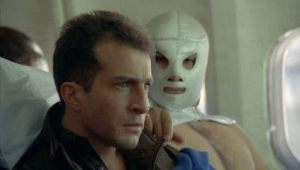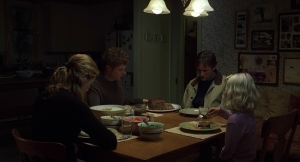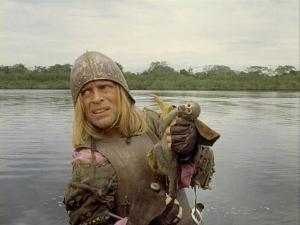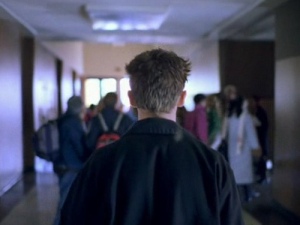Its first two-thirds are utterly hypnotizing and fascinating – that may be because I’m still relatively close to the high school experience, and can still relate to that age and it’s frame of mind – but even so, I think Van Sant has captured a gentle form of lightning in a bottle: the floating, aimless feeling of North American adolescent life. PARANOID PARK explores this even more so, and effectively, but I feel like ELEPHANT does a better job of it by not being focused around one individual. By showing its universality among students, Van Sant more strongly documents its impact on daily lives; it’s the sort of sense that doesn’t take a lot of time to sink in, but multiplies its effect each time it is presented anew. That the film’s “climax” – and really, that’s not what it is – is where the film stumbles is curious; I found the simple exploration of high school life to be more poignant and affecting than the inevitable massacre. And even though the massacre isn’t tacked on, it still ends up feeling like that. Mike D’Angelo calls it pornography for the way it holds us in suspense for an hour, waiting for the promised violence, and I can agree to a point with his argument that Van Sant is shamelessly manipulating us, sometimes too cheaply, but overall I’d say it transcends those flaws and offers a potent portrait of teen malaise. It’s first sixty minutes are masterful; it’s last twenty are merely effective.
Solo Con Tu Pareja (1991) Alfonso Cuaron
It’s saucy and entertaining, which is about all you need for a functioning sex farce. Cuaron, as always, skews deeper than the well-staged hijinks in his exploration of a man – Tomas – and his inner turmoil with his tomcat ways. Perhaps what’s most striking is Cuaron’s collaboration with CHILDREN OF MEN cinematographer Emmanuel Lubezki, a partnership that in its infancy yields rich, dark images. If this were an American film made today, it would be given the Wes Anderson originated indie look (which acts like yellow was never discovered before), or something rougher and more documentary-like (as Cuaron went with Y TU MAMA TAMBIEN). The cuteness of that style would rob this story of its gravitas; even as Tomas runs around in this preposterous plot, his problems are magnified and given great importance on a psychological level, simply because of the contrast, saturation, and overall visual detail of each frame. As it is, it is the best looking screwball sex comedy I’ve ever seen.
As it hurtles towards its conclusion, it starts to really touch on its thematic depth, beautifully expressed in facial hints and simple statements by Tomas, reflecting on the weight of his sins, finally admitting to his heartbroken crush, Clarisa, that “it was wrong” to sleep with all of those women, a bad habit developed like a child stepping on bugs: “You like the crunch but you don’t know why.” There’s a real poignancy waiting to be brought to the surface, but Cuaron never quite seals the deal – instead, Tomas’ and Clarisa’s fatalism-tinged coupling, while expected, doesn’t offer the sort of closure that we seek vicariously through Tomas. Perhaps this is because of the easy out of making Clarisa’s fiancé a cad, thus justifying her own immoral antics in movie-world logic. Perhaps it’s because she spends time raging against bed-hoppers — a rant that draws Tomas into confessing his own randy ways — and then ignores said feelings to have a quickie with the lothario. He needs more than more lusty sex, and while the deal gets sweetened by their marriage (a real commitment from the Tom Jones), the film ends on a surprisingly mixed note: Tomas eyes a pair of women in an airport while heading to his wife’s flight, but staying (I think) faithful. It’s a simple acknowledgement of the effects of a reckless sexual lifestyle, the sort of fast living that leaves scars long after the original wounds are self-inflicted.
While the more dramatic elements don’t mesh as well as hoped for with the comedy, it’s not the sort of combination that destroys itself. The drama is shaky, but the black comedy proves darkly delicious. The two columns coexist and work within their own terms; the result is a mostly agreeable blend of spice and bitterness, undercooked just enough to disappoint. On most levels, this is a brilliant debut, but the most important one misses the boat.
A History of Violence (2005) David Cronenberg
The first scene is a stunningly precise piece of cinema, perfectly pitched (particularly in the sound design), strikingly atmospheric; full of mystery and dread, all conveyed in a simple shot of two men leaving a motel. In its 4-5 minute running time, it puts the entirety of NO COUNTRY FOR OLD MEN to shame, covering similar territory in instilling horror at human evil. These two killers are more terrifying than any Anton Chigurh; their banal, psychotic bloodletting is completely believable over Chigurh’s semantically informed murdering. That the rest of the film doesn’t live up to this first scene’s promise isn’t a strike against it, as it’s weaker moments (particularly the high school scenes) are offset by an electrifying finale, a truly shattering and intimate moment between soul mates; we share every second, every ripple of unspoken knowledge. These actors’ faces – Viggo Mortensen and Maria Bello – contain enough tortured life, and grace, to power ten more films. What comes in between these two perfect scenes is compelling enough, helped along by the reliable Ed Harris, and a show-stopping William Hurt. Not a perfect film, but maybe a masterpiece.
Aguirre, The Wrath of God (1972) Werner Herzog
I knew AGUIERRE was a great film after six minutes. It is madness, first captured in emulsion, and then reflected back at the audience in waves of sorrow, frustration, and failure. Herzog’s camera drinks it all in like a documentary on conquistadors. Herzog is famous for speaking of the need for new images; AGUIERRE is like a deranged coffee table book made to fulfill that need.
Madness is the order of the day, and madmen are to be found both in front of and behind the camera. The tone veers from dour fatalism into surrealist Pythonism, before settling on a sort of bemused observation as Aguirre chases monkeys around his festering raft. As Aguirre, Klaus Kinski wears one expression for most of the film, and somehow contains a careening world within that visage. It’s a film that exhilarates and saddens, for the same reason: nothing like this will ever be seen again, so strong is its ambition, so terrible are its circumstances. There is only one Herzog. In my mind, the closest film of comparison is APOCALYPSE NOW, but even that masterpiece takes its time to make its case. Aguirre’s first few minutes are the descent into a world without reason, and it spends its remaining time preventing us from climbing out of that pit. That Herzog plots such a predicament and wrestles one of the greatest films ever made out of it is indeed an achievement.
